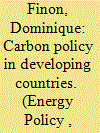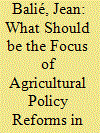|
|
|
Sort Order |
|
|
|
Items / Page
|
|
|
|
|
|
|
| Srl | Item |
| 1 |
ID:
166989


|
|
|
|
|
| Summary/Abstract |
Carbon pricing might not be appropriate as the main element of the carbon policy package in emerging and developing countries (DCs), because the political economy constraints are greater than in developed countries. Non-price instruments and policies such as efficiency standards, market-oriented regulation, subsidies for clean technologies and public programs involving low carbon infrastructure should be preferentially developed to deal with market and regulatory failures, which are more widespread than in developed countries. These approaches are most effective in orientating technology and infrastructure, the principal means to achieving the mitigation imperative in DCs. Moreover, even if, in theory, policy packages using non-price instruments are less socially efficient than those focused on carbon pricing, they allow governments to circumvent political economy constraints, because their costs to consumers and citizens are not generalized and tend to be much less visible, while their redistributive effects are, if appropriately designed, generally not too regressive. In the end, developing a carbon policy that emphasizes non-price instruments and measures will pave the way to leverage carbon pricing as the main pillar of their future carbon policy in long term.
|
|
|
|
|
|
|
|
|
|
|
|
|
|
|
|
| 2 |
ID:
180173


|
|
|
|
|
| Summary/Abstract |
The aim of this paper is to test for the persistence of the landlord-tenant energy efficiency problem in the residential rental property market in the presence of information on property energy performance. To do this, we compare the efficiency of rental and non-rental properties using a combination of Coarsened Exact Matching (CEM) and parametric regression. We use a sample of 585,578 residential properties in the Republic of Ireland - a region that legally requires rental properties to display energy performance certificates when advertised. The findings suggest that the landlord-tenant problem is present in the Irish rental market but that it is not uniform across locations, indicating the influence of other factors. To explore this further, we exploit the regional variation in rental property prices. We find a larger difference between rental and non-rental properties’ energy efficiency in markets with scarcity in rental property supply. In addition, we are able to take advantage of a unique trait in building design to compare rental and non-rental properties which were identical at the time of their construction. The findings from this sub-group mirror our finding for the sample as a whole.
|
|
|
|
|
|
|
|
|
|
|
|
|
|
|
|
| 3 |
ID:
170360


|
|
|
|
|
| Summary/Abstract |
While a lot of research has been conducted on agricultural subsidies and other forms of policy transfers in developed and developing countries alike, substantial data constraints have characterised those conducted in developing countries. For this study, we employ a novel and uniquely developed dataset on these policies in Sub-Saharan Africa (SSA), to analyse the impact of policy reforms, using the latest available GTAP 9.1 Data Base, in the widely employed GTAP framework, for the first time. We simulate the scenarios of removal of output subsidies, removal of ‘market development gaps’ within and outside the country. Our results indicate that removing market development gaps is likely to increase the agricultural output without affecting trade much, while removing the subsidies could harm output a lot by import-substitution of the costly domestic output. We conclude that governments in SSA may do well to focus on developing their markets better rather than cutting the assistance to their farmers, which could in fact be counter-productive instead of raising the efficiency of domestic farmers through competition.
|
|
|
|
|
|
|
|
|
|
|
|
|
|
|
|
|
|
|
|
|